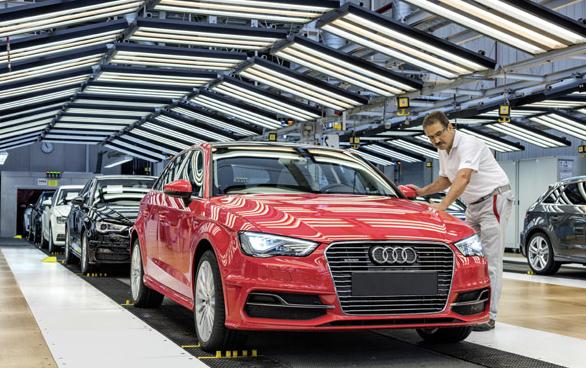

The Audi A3 Sportback e-tron model rolls off the production line in Ingolstadt, Germany. (Photo/Provided to China Daily)
Premium carmaker adapts to needs of No 2 economy
German premium carmaker Audi AG is shifting its top priority from sales volume to delivering higher quality and more environmentally friendly products in China, its biggest single market, to cater for the "new normal" of slower growth of the world's No 2 economy.
Rupert Stadler, Audi's chairman and CEO, said in an interview with China Daily last week that the company predicted the "new normal" of China's economy two or three years ago and acknowledged the situation would decelerate the vehicle market.
"We will pay more attention to the quality of our products to meet local customer demand. And then we seek sales volume," Stadler stressed.
"My understanding of the 'new normal' is that the most important thing is to improve people's life quality in China which demands us in the auto industry to provide new technologies," he added.
He said Audi would continue to introduce new products and technologies into China to meet stricter environmental protection requirements and minimize pollution.
The company plans to launch its A3 e-tron plug-in hybrid compact car this year in China as imports and produce large-sized A6 plug-in hybrid sedan in the country next year, he said.
"We will have new sales growth in China in coming years, but it will not always be double digital," he said.
Audi's China sales surged by 18 percent to 578,000 cars last year from 2013, maintaining its 2-decade-long lead in the country's premium car sector.
At an annual press conference in Ingolstadt, Germany, last week, Stadler said the Chinese market is expected to account for 35 percent of the company's annual global sales of 2 million units before 2020. Last year, Audi moved 1.74 million cars globally.
Chinese Premier Li Keqiang lowered the country's economic growth target to 7 percent this year from last year's 7.5 percent in his work report during the third session of the 12th National People Congress which closed yesterday.
Calling new-energy vehicles one of the "strategic emerging industries", Li said the government would continue to promote the use of such vehicles this year to cut emissions and air pollution.
The Chinese government now provides subsidies to buyers who choose new-energy vehicles, including purely electric, plug-in hybrid and fuel cell cars.
Other carmakers are also keen to introduce new-energy cars into China. BMW in January launched a locally made 5 Series plug-in hybrid sedan.
Audi, together with its parent company Volkswagen Group, now runs a joint venture with China's FAW Group. The venture has plants in the northeastern city of Changchun and in Foshan in the south to produce Audi cars, such as the A6, A4, A3, Q5 and Q3.
Audi's global sales revenue rose by 7.8 percent on 2013 to be valued at 53.79 billion euros ($56.5 billion) last year. The company's profits before tax also soared by 12.5 percent to 5.99 billion euros.
Audi reports sales record in 2014
2015-01-10Audi calls back 850,000 A4s for air bag problems
2014-10-24Audi sets new sales record in China
2014-10-07Shine dims for once-golden Audi
2014-09-29Audi faces fine for price fixing
2014-09-15Audi to showcase record-high 19 models
2014-08-29Copyright ©1999-2018
Chinanews.com. All rights reserved.
Reproduction in whole or in part without permission is prohibited.